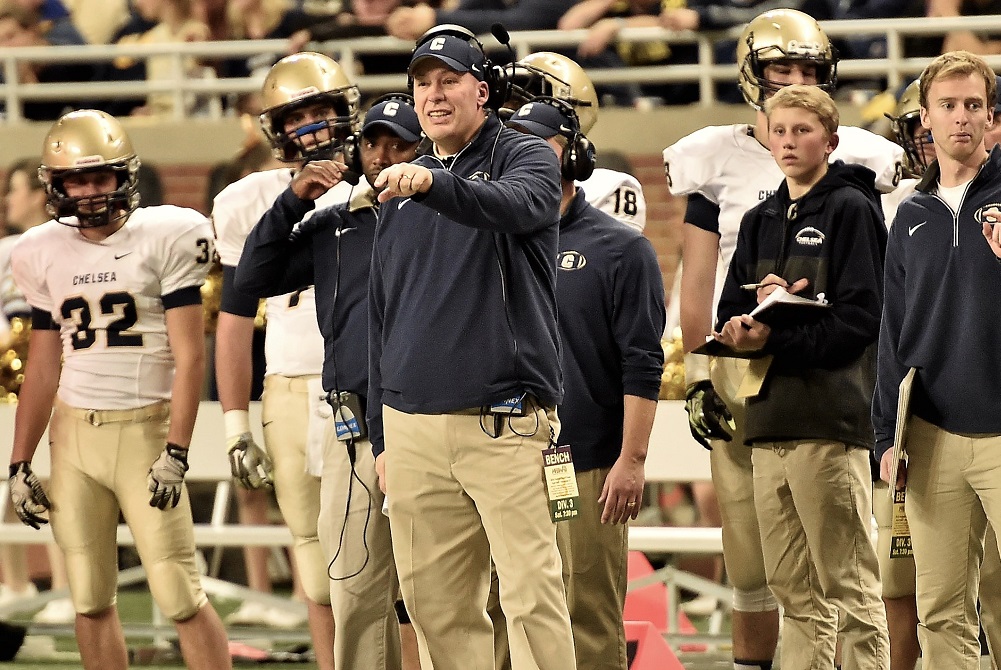
Rep Council Approves Expanded Basketball Schedules, Classification Changes at Winter Meeting
By
Geoff Kimmerly
MHSAA.com senior editor
March 29, 2022
An increase in the number of regular-season games high school basketball teams are allowed to play may be the most visible action taken by the Representative Council of the Michigan High School Athletic Association during its annual Winter Meeting on March 25 in East Lansing. However, a change in classification procedure expected to bring more equity to tournament groupings should have the most far-reaching effects across all sports.
The Winter Meeting frequently serves as an opportunity for the Council to discuss items expected to come up for action at its final meeting of the school year, scheduled for May 1-2. However, the Council took a number of actions at this meeting as they relate to scheduling currently underway for the 2022-23 school year, or Spring tournaments this May.
The Council approved a Basketball Committee proposal that will allow, beginning with the 2022-23 season, high school basketball teams to play up to 22 regular-season games at every level (varsity, junior varsity and freshman). Teams previously played a maximum of 20 games during the regular season; this adjustment brings MHSAA school schedules in line with what is allowed in most other Midwest states. Additionally as part of that proposal, mandatory preseason practice was reduced by one week, allowing teams to begin playing games after 14 days instead of 21.
The Council also approved a proposal by the Classification Committee that will result in postseason divisions more reflective of the number of schools actively sponsoring teams for that season. Divisions are assigned by taking the number of teams playing a sport and dividing equally by the number of team championships awarded in that sport (for example, four in baseball and softball). Previously, by the time seasons started the smallest-school divisions in many sports ended up with fewer teams than larger-school divisions because several small schools would declare they would be sponsoring a team during the classification process in March but then be unable to do so because of lack of participation or other reasons.
With this change, schools that have indicated they will sponsor a sport but haven’t participated in that sport as a team or with individual qualifiers over the previous two years will be removed from the classification process before divisions are determined. Those schools that have been removed must then notify the MHSAA they have an active team before being added back into the tournament.
A number of other actions will affect competition as quickly as this spring’s MHSAA Tournaments, and into the 2022-23 school year.
The Council approved a Cross Country/Track & Field proposal to allow for more MHSAA Tournament opportunities for wheelchair athletes. Starting with this Spring 2022 season, Regional and Final meets will include four events for wheelchair participants – 100, 200 and 400-meter races and shot put. These events will be open to wheelchair track & field athletes at MHSAA member schools. Additionally, the Council approved the expansion of postseason Paralympic opportunities in swimming, adding a 100-yard freestyle heat to the 50-yard freestyle heat that has been offered at Finals since 2020.
In baseball and softball, the Council approved committee proposals in those sports to allow District first-round games to be played during the week before Memorial Day. Baseball may play first-round games that previous Thursday, Friday or Saturday, and softball may play that previous Thursday and Friday, beginning this upcoming season. Previously, all first-round games were played the Tuesday after Memorial Day. This change is expected to alleviate pitch count concerns in baseball and provide scheduling flexibility for later District rounds that could allow athletes – especially at small schools where baseball and softball players frequently participate in track & field – opportunities to compete in both sports during the week following Memorial Day.
Another change proposed by the Classification Committee and approved by the Council will raise the enrollment cap for cooperative hockey programs, potentially allowing for more opportunities for schools to contribute athletes who wish to play the sport. Nearly 50 percent of hockey teams playing in the MHSAA Tournament are cooperatives made up of students from multiple schools, and for hockey those schools’ enrollments now may total up to 5,500 students, an increase of 2,000 students for hockey only. Schools participating in a cooperative hockey program must continue to receive Executive Committee approval and show a demonstrated lack of participation in hockey.
The Council also approved a Classification Committee proposal that will allow football teams to opt up in division after the annual release of classifications for the upcoming season in late March/early April. Football teams may opt up one division, with Executive Committee approval, and must show reason and rationale for their request. All football opt ups will be for a minimum of two years, and the Executive Committee will consider those opt-up requests at only its April and May meetings each year.
The Council approved a number of increased benefits for MHSAA-registered game officials, including raises in postseason game fees paid to officials across all sports. Also moving forward, MHSAA officials will be provided membership in the National Association of Sports Officials (NASO), which will provide expanded liability insurance plus additional resources and professional services for all MHSAA registered officials. The Council also approved a change to the registration process and fees that will automatically provide each official registration in two sports. All three changes were proposed by the Audit & Finance Committee.
The Council also approved a rule change allowing the use of school transportation during summer, but it must be funded from school-approved activities of booster clubs, school teams, student groups and community, civic or service groups. This includes the use of busses, vans and other vehicles owned or leased by the school district or operated by any entity with which the district contracts to provide transportation services.
The Representative Council is the legislative body of the MHSAA. All but five members are elected by member schools. Four members are appointed by the Council to facilitate representation of females and minorities, and the 19th position is occupied by the Superintendent of Public Instruction or designee.
The MHSAA is a private, not-for-profit corporation of voluntary membership by more than 1,500 public and private senior high schools and junior high/middle schools which exists to develop common rules for athletic eligibility and competition. No government funds or tax dollars support the MHSAA, which was the first such association nationally to not accept membership dues or tournament entry fees from schools. Member schools which enforce these rules are permitted to participate in MHSAA tournaments, which attract more than 1.4 million spectators each year.

Longtime Chelsea High School Administrator, Coach Bush to Join MHSAA Staff as Assistant Director
By
Geoff Kimmerly
MHSAA.com senior editor
December 21, 2022
Brad Bush, a highly-respected educator, administrator and coach over the last three decades, has been selected to serve in the position of assistant director for the Michigan High School Athletic Association, beginning Jan. 17.
 Bush, 52, taught and coached at East Kentwood High School for four years before beginning a tenure at Chelsea High School in 1997 that has included teaching, then serving as athletic director and later also assistant principal and leading the football program as varsity coach from 1997-2002 and again from 2004-18.
Bush, 52, taught and coached at East Kentwood High School for four years before beginning a tenure at Chelsea High School in 1997 that has included teaching, then serving as athletic director and later also assistant principal and leading the football program as varsity coach from 1997-2002 and again from 2004-18.
He also has served as a statewide delegate on the MHSAA Representative Council during the last year and provided leadership in multiple roles, including president, for the Michigan High School Football Coaches Association (MHSFCA) since 2005.
Bush will serve as the MHSAA’s lead administrator for baseball and also among lead administrators for the officials program, which includes more than 8,000 registered officials in all sports. Bush also will be assigned additional duties in other sports based on his vast experiences. He was selected from a pool of 34 applicants.
“I’m incredibly excited to have Brad join our team,” MHSAA Executive Director Mark Uyl said. "He’s been an outstanding athletic director and coach who is highly-respected by those who know him.”
As Chelsea athletic director, Bush annually has supervised a staff of 110 coaches across 31 programs, with nearly 70 percent of the high school’s 800 students participating in athletics. As a teacher and assistant principal, he has served on Chelsea’s School Improvement Team and on multiple committees that provided instructional leadership including in the development of the district’s new trimester schedule. In his roles with the MHSFCA, Bush helped direct an organization with more than 2,200 members and also served as the association’s treasurer and liaison to the MHSAA.
Bush is perhaps best known, however, for his coaching success. Over 22 seasons, he led Chelsea’s varsity football team to a 169-60 record, 13 league championships, 18 playoff appearances, seven District titles and a Division 3 runner-up finish in 2015. During his break in tenure as Chelsea coach, Bush served as an assistant football coach and recruiting coordinator for Eastern Michigan University during the 2003-04 school year, and he has served as an assistant coach at Albion College the last four seasons contributing to the team’s two league titles and appearance in the 2021 NCAA Division III Playoffs.
“I feel like joining the team at the MHSAA is an opportunity I couldn’t pass up,” Bush said. “The 26 years I spent at Chelsea were some of the best times of my life. It’s a professional transition that in the back of my mind, if this opportunity came, was something I needed to do.
“Over time, I’ve grown to care about the bigger picture of athletics and appreciate the role of the MHSAA in protecting high school athletics in Michigan.”
Bush is a 1988 graduate of Ypsilanti High School. He studied and played quarterback at Cornell University before returning and graduating from EMU after majoring in history and minoring in social studies. He earned his physical education endorsement from EMU in 2000 and his master’s in physical education and sports management from EMU in 2002. He has earned continuing education credits in sports management from Drake University and completed the Path to Leadership program from the Michigan Association of Secondary School Principals (MASSP).
Bush was inducted into MHSFCA Hall of Fame and Ypsilanti High School Hall of Fame both in 2019. He and his wife Laura have three adult children, two daughters and a son.
PHOTO Chelsea coach Brad Bush directs his team during the 2015 Division 3 Final at Ford Field.

